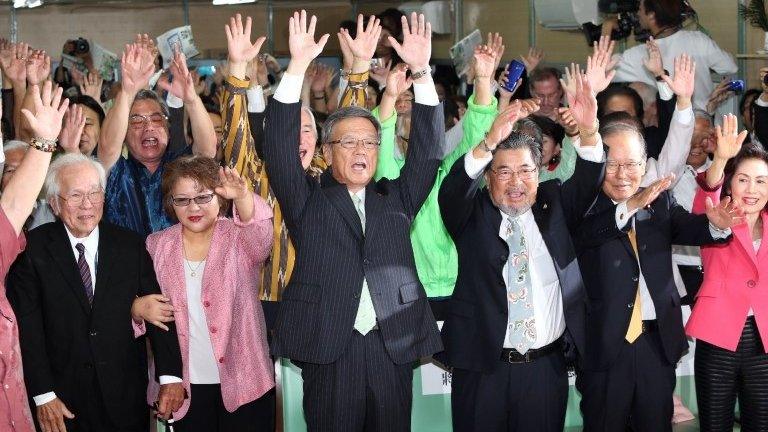Where Japanese fight a US military base with kayaks
- Published
Rupert Wingfield-Hayes travelled to Okinawa to follow the protesters on the water
As Japanese Prime Minister Shinzo Abe travels to the US for a state visit, one Japanese island is pushing back against a new American military base.
This week in Washington, Japan's Prime Minister Shinzo Abe will sit down with President Barack Obama and tell him the US-Japan military alliance is stronger than ever.
In many ways this peculiar love affair between the US and Japan, which began after one country dropped atom bombs on the other, does look pretty solid.
But while Japanese people may like the protection that the US alliance brings, they don't much like the US bases and tens of thousands of personnel that come with it.
Most will never get to see the 50,000 US military personnel stationed in their country. That's because most of the Americans are far away on the island of Okinawa.
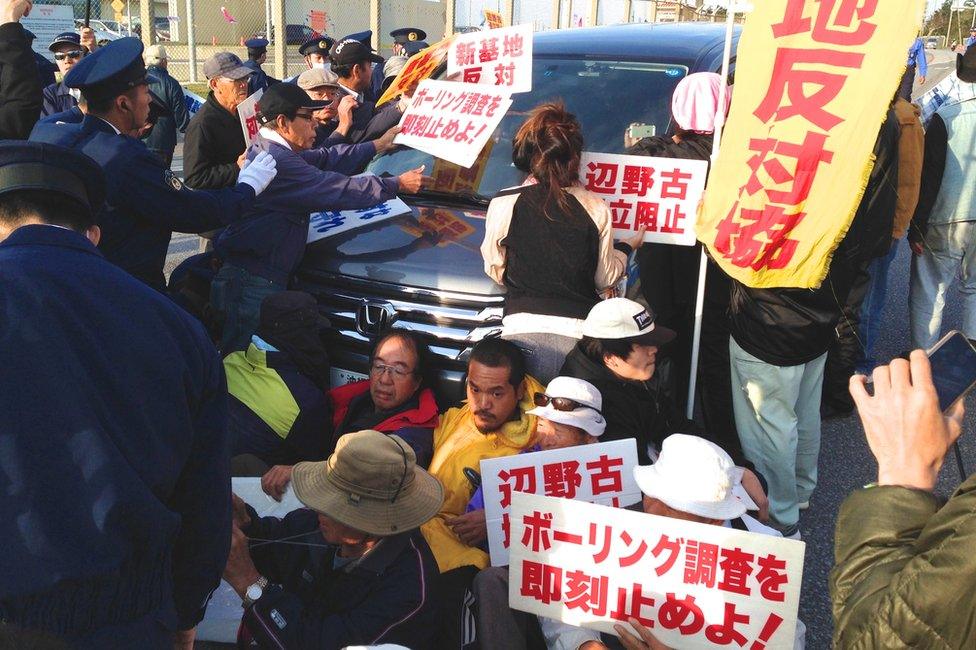
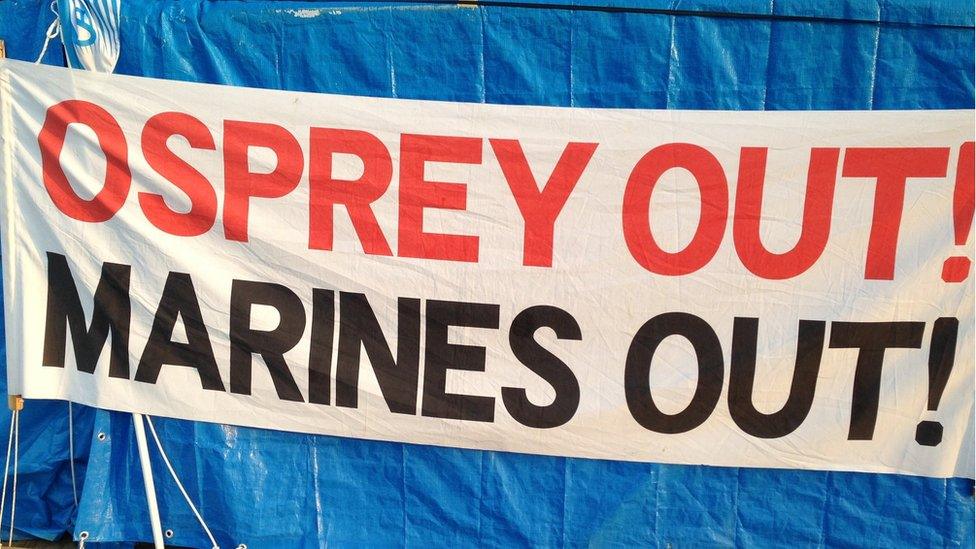
Okinawa makes up just 0.6% of Japan's land mass but, as the locals will never tire of telling you, it hosts over 70% of the US bases in Japan.
The people of Okinawa are weary of the 70 years of "semi-occupation". They have long complained of the noise and danger from US planes and helicopters flying day and night.
Most of all they complain of the young men of the US Marine Corps, who are seen as drunken, violent and a threat to Okinawan women.
In fact the statistics speak otherwise - the incidence of rape, murder and other crimes by American personnel in Okinawa is low.
But a small number of horrific cases have done huge harm - in particular the 1995 gang rape of a 13-year-old Okinawan schoolgirl by four US Marines changed attitudes here dramatically.
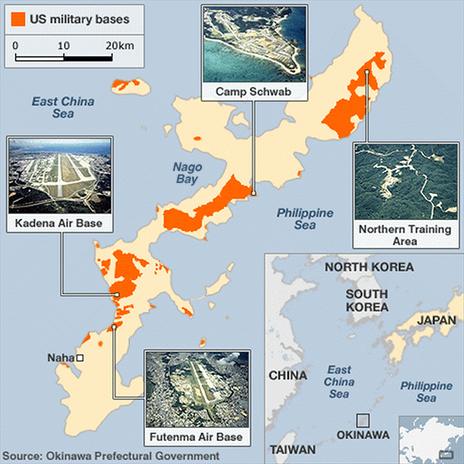
It's a big reason why the US government wants to move Futenma, the largest Marine base in Okinawa, out of the densely populated south of the island to a remote spot 60km away.
It sounds like a good idea. The city of Ginowan will get a big chunk of land back. Its people will get to sleep at night and its daughters will no longer have to fear.
But for most Okinawans, 60km is not nearly far enough. They want to see the US Marines moved much further - say Guam for instance, or even better, Australia.
As plans for building the new base at Camp Schwab have moved forward, attitudes here have hardened. Tokyo insists there is no other choice.
Okinawans have responded by kicking out the pro-Tokyo governor and electing a new one who has promised to block any construction. Tokyo has simply over-ruled him.
It is, say many in Okinawa, the behaviour of a colonial regime, and it is making people here mad.
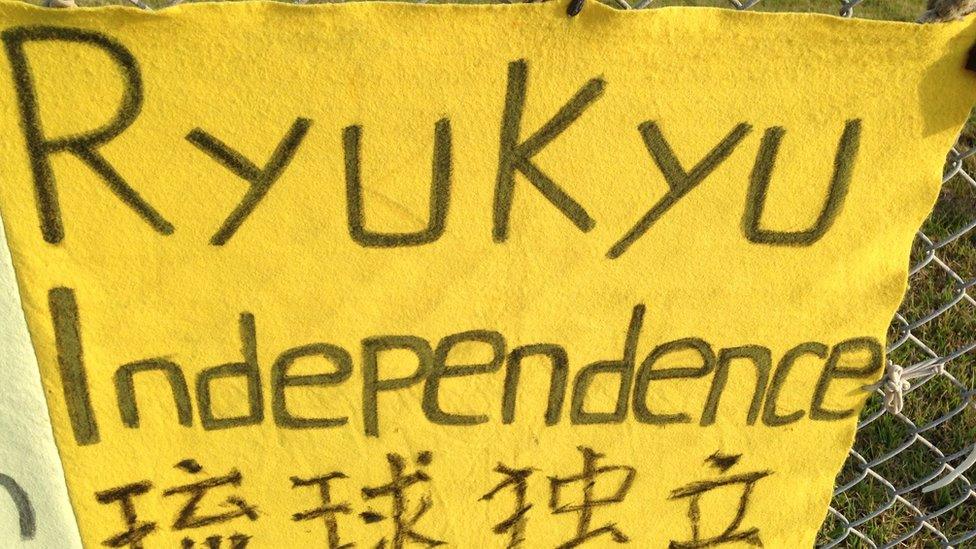
A protest banner refers to Ryukyu, the Okinawan kingdom annexed by Japan in 1879
At 6:30 on a chilly morning I find myself outside the gates of Camp Schwab with around 100 elderly, but determined, protesters.
At first it is noisy but pretty docile. But then as the construction crews start to arrive the elderly protesters roll in to action.
En masse they rush out in to the road and lie down in front of one of the vehicles. The police struggle to pull them away, four policemen for each protester. They kick and scream.
"Why are you betraying your own people?", they shout. "Why are you helping the Americans?"
Through it all, blaring away on his megaphone, is protest leader Satoru Oshiro.
"It is 70 years since the end of the war, but still we have to bear the overwhelming burden of US bases here in Okinawa."
"In a democratic country that is not right," he says. "Now they want to build a new base here, we cannot allow that to happen."
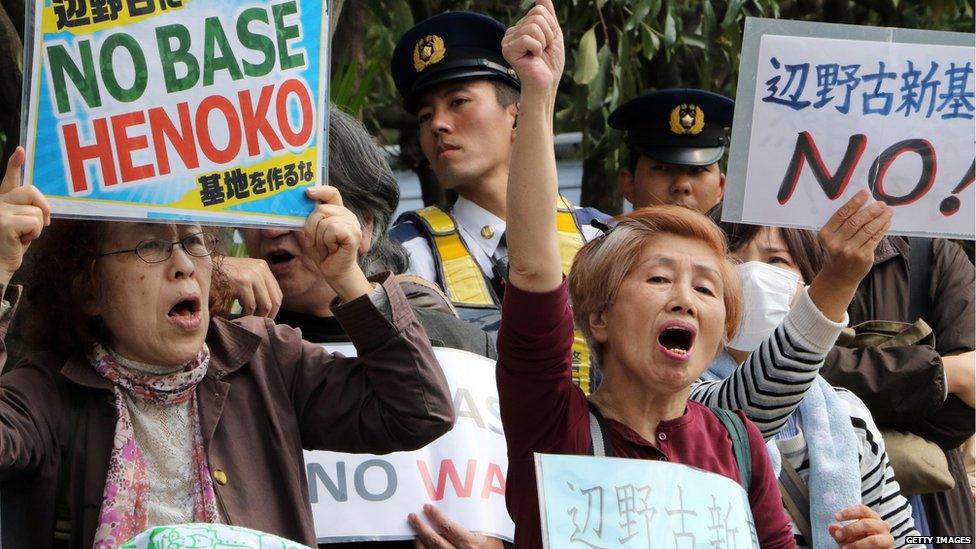
Protests have made it all the way to Tokyo
The emotions here are complex. Okinawans feel semi-occupied by the US military, but their feelings towards Tokyo are also deeply ambivalent.
There is deep bitterness here, in particular about how their overlords from the "mainland" sacrificed them at the end of World War 2.
"Okinawa is the only place in Japan that experienced battle on the ground," says Satoru Oshiro "We cannot forget the tragedy, the horrible past."
And it was unspeakably horrible.
On a hilltop just outside the capital Naha, I find Takamatsu Gushiken digging for human remains.
He and a small team of volunteers have been doing this for over 30 years. All they have is some old trowels, a few buckets and one yellow metal detector. Each year they uncover the remains of around 100 people - most are civilians, many are women and children.
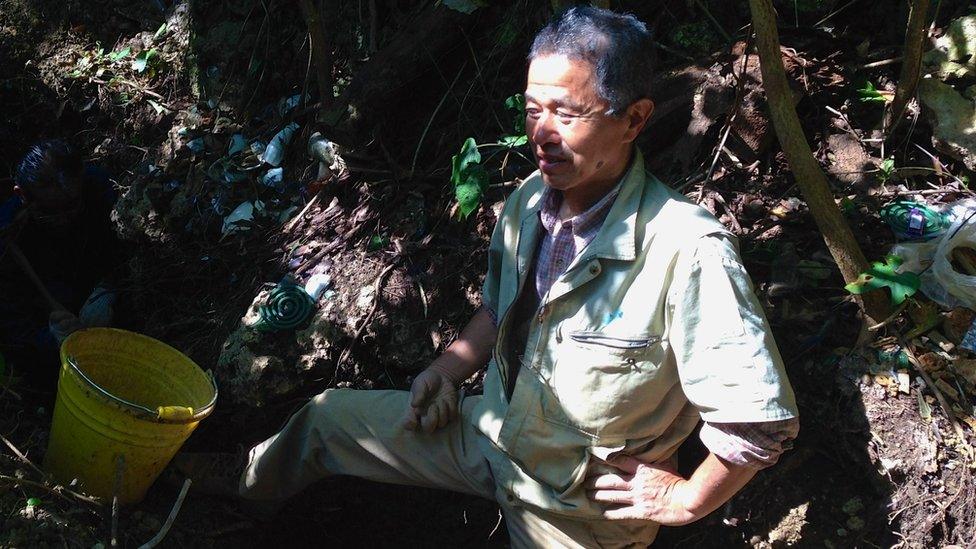
Takamatsu Gushiken unearths the dead from the battle of Okinawa
"When I find the bones of child and woman together, I cannot help but think that must be a mother and child and think about which died first," Gushiken says.
"I heard of lots of babies sucking their mother's breast after she has died. Was it like that or did the child go first and the mother hung on to the baby? It makes it very hard for us to see sights like that."
All the more so when you realise that many of the victims he unearths did not die in battle but killed themselves on the orders of Japanese military commanders.
"The Japanese military was the only military that ordered soldiers and people to take their own lives, rather than surrender.
"People were taught that killing themselves was a noble act. When I see those remains, it is very hard for me to forgive teaching in Japan at that time."
The carnage wrought by this policy is terrible to think about.
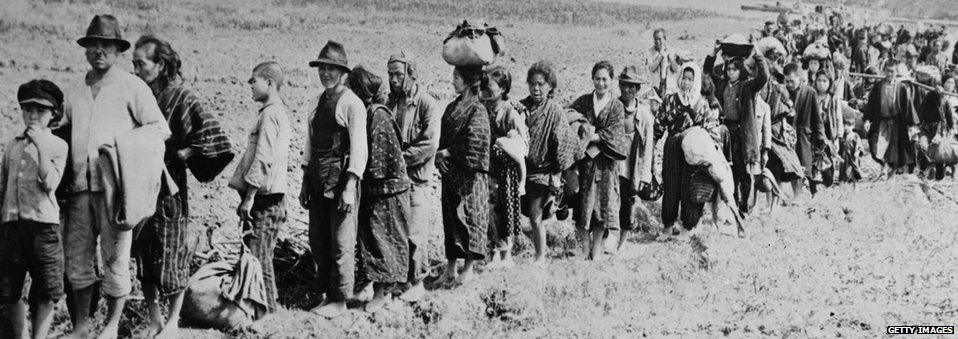
Okinawans returning from hiding places in the hills on 17 April 1945 following the invasion by Americans
Perhaps a quarter of a million people died here in three months of slaughter from April to June 1945. No-one has ever apologised to the people of Okinawa for what they were put through, not the US, certainly not Tokyo.
Back at Camp Schwab the protesters have now taken to the water.
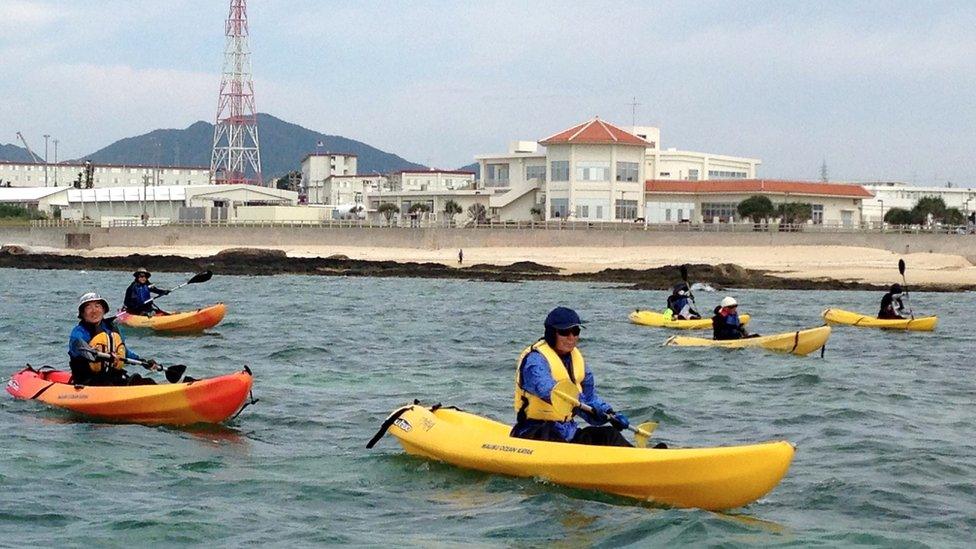
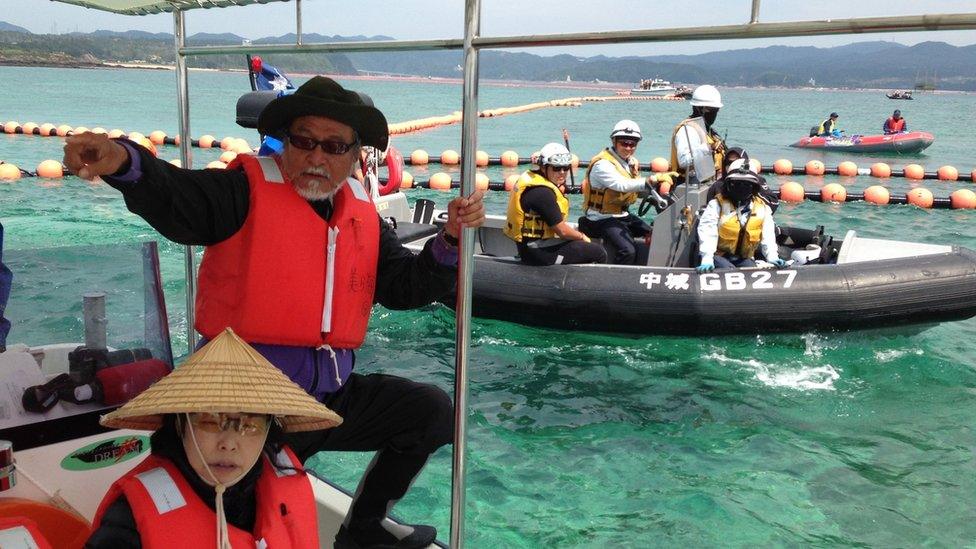
Much of the new marine base will be built by landfilling a pristine reef with millions of tonnes of rock and soil and building two long runways in Henoko Bay.
The protesters are now in small sea kayaks. They can slip in to the shallowest water and dodge between rocks.
For an hour there is a game of cat and mouse as the tiny kayaks try to slip into the construction zone. But the coastguards, in their powerful speedboats, outflank them and round them up like a dog herding wayward sheep.
It is an unequal contest - but the sentiment of people here in Okinawa is clear. They don't want the new base.
When Prime Minister Abe tells President Obama everything here is under control, he should not be reassured.
- Published30 March 2015
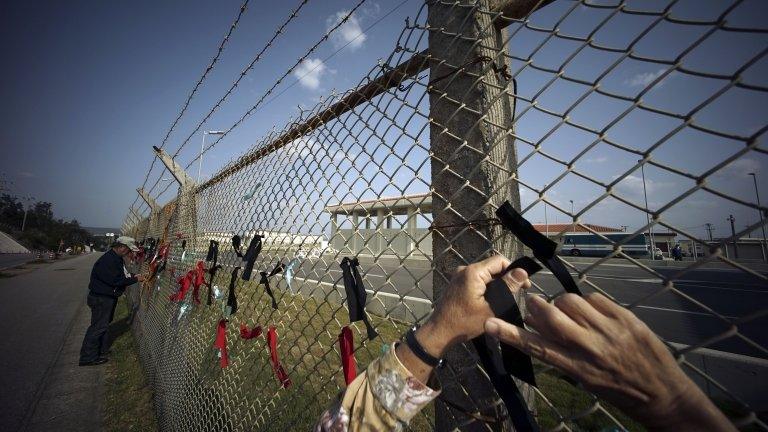
- Published17 November 2014
